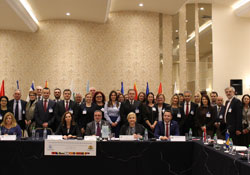South-eastern Europe Health Network: health promotion for children in focus

WHO
Members of the South-eastern Europe Health Network (SEEHN) agreed to enhance regional efforts to improve children’s health by promoting healthy lifestyles and addressing noncommunicable diseases (NCDs) at the Network’s 39th plenary meeting.
The meeting took place in Sofia, Bulgaria, on 23–24 November 2017. It marked the end of Bulgaria’s SEEHN Presidency. Israel will take on the Presidency from January to June 2018.
WHO/Europe shared recent developments related to NCDs, including the outcomes of the WHO Global Conference on NCDs in Montevideo, Uruguay, in October 2017; progress on the Action plan for the prevention and control of NCDs in the WHO European Region and its roadmap; and updates on the formation of the new WHO high-level commission on NCDs.
Participants identified specific areas for stronger collaboration between SEEHN and WHO/Europe, including work on hypertension and deaths from cardiovascular diseases among men.
A new Regional Health Development Centre (RHDC) on Sexual and Reproductive Health was also designated during the meeting. These specialized centres across SEEHN member states support intercountry cooperation and resource pooling on key public health issues. This will be the second RHDC in Romania; an existing RHDC in the country focuses on blood and blood safety.
Implementing the Chisinau Pledge and future plans
Participants discussed an action plan to implement the Chisinau Pledge 2017–2020, with objectives, measures and health indicators. The Chisinau Pledge, which commits SEEHN member states to coordinate their efforts towards universal health coverage, emergency response and health workforce mobility, was agreed in April 2017.
They also gave consideration to extending WHO technical assistance in 2018–2019 through a multicountry model. This would complement the provision of direct assistance to SEEHN member states outlined in the biennial collaborative agreements between WHO/Europe and ministries of health. The main focus of the technical assistance provided by WHO/Europe is based on the Chisinau Pledge. It is hoped that these extended activities will be endorsed through a collaborative agreement in 2018.
The meeting in Sofia provided an opportunity to reflect on developments, activities and challenges during the Bulgarian SEEHN Presidency. Participants also considered health priorities for Israel’s SEEHN Presidency as of January 2018, and for the Bulgarian Presidency of the Council of the European Union, which also begins in January.
Participants included national health coordinators from SEEHN member states, representatives of partner countries and international organizations, directors of RHDCs and ambassadors.
New members of Executive Committee
Four new members were elected to the SEEHN Executive Committee for a 2-year term: Serbia as Chair, and Israel, Montenegro and Romania as members.
About SEEHN
SEEHN is a multigovernmental political and institutional forum for regional collaboration on the health and well-being of Albania, Bosnia and Herzegovina, Bulgaria, Israel, Montenegro, the Republic of Moldova, Romania, Serbia and the former Yugoslav Republic of Macedonia.
Cooperation at political and technical levels has resulted in long-term partnerships between SEEHN member states and the numerous partner countries, international organizations and nongovernmental organizations that have supported the Network technically and financially since its foundation in 2001.



